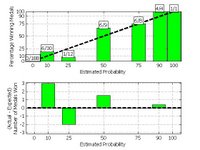I've got a few odds and ends I wanted to tie up from the 2006 Winter Olympics, including my very early predictions about Canada's performance in 2010. First I would like to recap predictions for 2006, and see how I did and where I went wrong.
My prediction of 21.1 medals for Canada was based on assigning probabilities for the first, second, and third medal for each of the 84 events. I allowed seven different probabilities: 0, 10%, 25%, 50%, 75%, 90%, and 100% (the last of these I used only once). I admitted that I didn't do very much research, assuming that my overestimates and underestimates would more or less balance out, because I was making such a large number of guesses. Canada ended up winning 24 medals.
Figure 1

Figure 1 — Comparison of predicted and actual medals won by Canada at the 2006 Torino Winter Olympic Games (click to enlarge).
It's always useful to check your assumptions, so I took a look at the number of medals actually won by Canadians that I put into each of these seven categories. (I am going to conveniently ignore, throughout this discussion, the fact that I listed names beside some of the probabilities; I'll just assume that when a Canadian won a medal, it was the Canadian I estimated for.)
It turns out that I didn't do too badly in assigning the original probabilities, and I did very well at assessing probability for the most likely winners. The figure in the inset at right shows the actual actual percentage of winners in each of the seven categories, and the difference between the actual number of winners and the expected number of winners. For the 100%, 90%, and 75% assignments, I was as close as I could possibly be; all of the five chances I put at 90% or more won medals, and six out of eight at 75% (the exceptions were in men's hockey and women's bobsleigh).
I was also exactly right about the no-hopers; not one of the entries I assigned a zero probability won a medal. The total number of correct predictions (188) looks impressive, but of course many of those were completely obvious, so it is difficult to assess how much credit I can take for my "perfect" score.
My biggest systematic error seems to have come in the 10% category, where I put 30 Canadian athletes or teams. Six of those (20%) won medals. If I assume that I had the 10% probability correct at the outset, the likelihood of getting exactly six medals from this group is less than 1 in 20; the likelihood of six or more medals is about 1 in 14. A more likely explanation is that I underestimated the chances for this group. I am not sure what further conclusion I can draw from that, but it might help guide my future predictions.
I would like to score myself against the COC's medal predictions, but I don't have any of the details. As far as I know, they didn't release any breakdown of their prediction to the public; I did see some articles claiming that "the COC has Pierre Leuders down for two medals" and the like, but I think they wisely held that kind of thing fairly close to the vest. I know that they got closer on the total (predicting 25), and they probably did better on the individual events, too, since they have a team of researchers tracking performances throughout the season.
It's kind of fun, though, to score myself against the professionals, so I took a closer look at the predictions from Sports Illustrated and the Associated Press. Of course there is no fair way to do this comparison, since both publications predict medals on a "True of False" basis, whereas I tried to attach a confidence level to each one. (I should also point out that these two sources attempted the prediction for every medal in every event, not just for a single country.) But just for fun, let's count all of my entries with 50% or higher as "True." That gives me a prediction of 22 medals instead of 21.1; SI predicted 21, and the AP predicted 24.
| Source | Predicted Medals | Correctly Predicted Win | Incorrectly Predicted Win | Unpredicted Win |
|---|---|---|---|---|
| Now That's Amateur | 22 | 17 | 5 | 7 |
| Associated Press | 24 | 16 | 8 | 8 |
| Sports Illustrated | 21 | 13 | 8 | 11 |
So by this scoring system — which is somewhat biased in my favour — I had more correct predictions than either publication, and fewer missed as well, even though my predicted total was not as close as the AP's.
Part 2 of this post will look at the 2006 Canadian medals by sport, and assess progress with respect to the goals of the Own The Podium 2010 program.


No comments:
Post a Comment